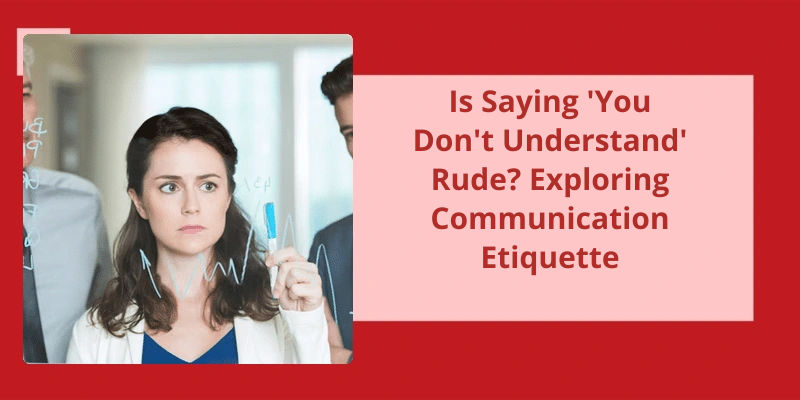Communication is an essential part of human interaction, and the way we convey our thoughts and feelings greatly affects the outcome of any conversation. One common phrase that’s often misconstrued as rude is "I don't understand." However, it isn’t the phrase itself that’s rude, but rather the way it’s delivered. Tone, inflection, and choice of words can greatly impact how a statement is perceived, and it’s important to choose these elements carefully when communicating with others. Therefore, it’s crucial to approach the situation with sincerity and politeness, as these qualities can go a long way in fostering positive communication and avoiding misunderstandings.
Is Saying I Don’t Know Rude?
However, there are certain situations where saying “I don’t know” may be appropriate and even necessary. For example, in a professional setting, it may be better to admit ignorance than to provide misinformation. Admitting a lack of knowledge can also present an opportunity for learning and growth. In fact, the most successful individuals are those who aren’t afraid to ask questions and admit when they don’t know something.
That being said, there are ways to phrase “I don’t know” that are more polite and productive than others. Rather than simply stating “I don’t know,” try acknowledging the other persons point of view or question before expressing your lack of knowledge. You can also offer to follow up on the subject or provide resources for further information.
Additionally, saying “I don’t know” can be a sign of vulnerability and honesty. It shows that you aren’t trying to conceal your lack of knowledge or deceive the other person. It can also open up opportunities for deeper conversation and connection as the other person may feel more comfortable being honest as well.
It’s all about context. While saying “I don’t know” may be considered rude in some situations, in others it can be a sign of honesty and willingness to learn. It’s important to consider the other persons perspective and adjust your language accordingly.
When communicating with others, it’s important to consider how the words you choose might be perceived. One common phrase that can be used to clarify understanding is “do you understand?” While this can be a direct way to get your point across, it’s important to be mindful of your tone and the context in which you use it. In some situations, this phrase can even be perceived as parental and punitive. So, how can you effectively check for understanding while maintaining a polite and respectful tone? Let’s explore some alternative strategies.
Is It Polite to Say Do You Understand?
In a professional or academic setting, it’s important to use language that’s both clear and respectful. Asking someone if they understand what you mean can be a helpful way to ensure that you’re communicating effectively, but it’s important to choose your words carefully. You might consider rephrasing the question to make it sound more collaborative, such as “Do you’ve any questions about what I”m saying?”. This allows the other person to feel more involved in the conversation and encourages them to ask for clarification if needed.
It’s also worth noting that some people might hesitate to say that they don’t understand something, even if they’re struggling to keep up with the conversation. This could be due to a fear of looking unintelligent or worrying about slowing down the conversation. In these cases, it’s important to create a supportive and inclusive atmosphere where people feel comfortable asking questions or seeking clarification. You might say something like “I”m happy to repeat myself if anything was unclear” or “Let me know if you need me to go over that again.”
Finally, it’s important to remember that communication is a two-way street. If you’re constantly asking someone if they understand, it might be a sign that you need to work on your own communication skills. This doesn’t mean that you’re a bad communicator, but it could indicate that you need to adjust your approach to better suit the needs of the other person. Consider taking a public speaking or communication class to learn more about effective communication strategies and how to adapt to different audiences.
By creating a supportive and inclusive atmosphere and focusing on your own communication skills, you can foster better understanding in all of your interactions.
With this in mind, it’s important to consider how our words and actions can impact the perceptions and experiences of those around us. Although we may have good intentions, there are certain phrases that can come off as dismissive or uncaring, such as saying “I understand.” In fact, this seemingly harmless statement can actually be quite harmful, as it can make the other person feel invalidated and ignored. So why is it bad to say “I understand”? Let’s explore this question further.
Why Is It Bad to Say I Understand?
There are a few reasons why saying “I understand” can be seen as problematic. Firstly, it assumes that the emotions being expressed can be easily grasped and generalized. However, everyones experiences and feelings are unique, and the complexity of these experiences can’t be fully understood by an outsider. Therefore, by claiming to understand, one is essentially oversimplifying and dismissing the complexity of the emotions being expressed.
It implies that the person speaking has experienced something similar and has thus “been there, done that.”. This can make the person expressing their emotions feel like their experience isn’t being taken seriously or fully appreciated.
By prematurely assuming that you understand, you could be preventing the person from fully expressing themselves. It can also prevent the person from fully exploring their emotions and finding a solution that works for them.
It’s easy to say “I understand,” but without truly empathizing with the person and showing that youre invested in their situation, it can come across as a shallow platitude. This can make the person feel like youre not really interested in helping them or understanding their situation.
While saying “I understand” might seem like a quick and easy way to show empathy, it can actually do more harm than good. By assuming that we fully understand someone elses feelings, were oversimplifying their experiences, being dismissive, and potentially shutting down communication. Instead, it’s important to truly listen to the person, acknowledge their feelings, and work with them to find a solution that works for them.
Source: Is it okay to say ‘I understand you’?..
Now that we’ve established what the phrase “I don’t understand” means, it’s important to delve deeper into the potential reasons why someone might utter these words. Is it purely a matter of not comprehending the language being spoken, or are there other factors at play? In the following sections, we will explore some of the most common reasons why people might express confusion or lack of understanding.
What Does Don’t Understand Mean?
The phrase “I don’t understand” is a simple yet powerful expression, conveying the idea that the listener isn’t following the meaning of the discourse. It can be used in several contexts, ranging from casual conversations to complex technical discussions. The phrase implies that the speaker is seeking clarification or further explanation to gain a better understanding of the subject.
It could also be interpreted as a polite way of asking the speaker to repeat or rephrase what was said. In academic or professional settings, the phrase often precedes a follow-up question or an attempt to seek more information to gain a comprehensive understanding of a topic.
In such cases, the listener may need more time to fully process the subject and ask for further clarification to make connections between the information received and their existing knowledge.
Instead, it’s a crucial tool for effective communication, enabling speakers to clear up any misinterpretations or misunderstandings that may arise during a conversation.
It’s a key component of effective communication, fostering open dialogue and helping speakers and listeners to reach a common understanding of complex concepts or ideas. As such, it’s essential to cultivate a culture of respect and patience when using this phrase or responding to it, to ensure that communication flows smoothly and efficiently.
Communication is a fundamental aspect of human interaction, and ensuring that one is understood is critical in conveying a message effectively. The use of phrases such as “Do you understand me?” or “Do you hear me?” is commonplace in everyday conversation as a means of verifying comprehension. However, there are many other ways to ask for clarification or to check for understanding beyond these familiar expressions that many may not be aware of.
Why Do People Say Do You Understand?
The phrase “do you understand?” is a common way to check understanding in conversations, meetings, and other communication scenarios. This phrase is used to ensure that the listener has grasped the meaning, context, and intent of the speakers message. It’s important to check for understanding to avoid misunderstandings, misinterpretations, and miscommunications that can cause confusion, frustration, and conflicts.
This phrase opens up a dialogue and encourages the listener to clarify or ask for clarification. It also shows that the speaker values the listeners opinion, perspective, and input.
This can happen when the speaker assumes that the listener isn’t paying attention, isn’t smart enough, or isn’t capable of understanding. Alternatively, this can happen when the speaker is over-emphasizing their point or attempting to control the conversation. When this happens, it’s important to respect the listeners intelligence, autonomy, and dignity by using alternative expressions.
Some examples include “does that make sense?”, “have I been clear?”, “is this clear so far?”, “would you like me to go over that again?”, “are there any questions so far?”, “does this align with your expectations?”, and “can you see where Im coming from?”. These expressions can convey the same message while avoiding repetition, monotony, or condescension. By using different language, the speaker can also demonstrate empathy, respect, and adaptability.
How to Give and Receive Constructive Feedback in Conversations
- Be specific and objective
- Use “I” statements instead of “you” statements
- Focus on behaviors, not personalities
- Offer suggestions for improvement
- Ask for feedback in return
- Keep emotions in check
- Show appreciation for the feedback received
Effective communication involves not only expressing ourselves but also acknowledging and validating the feelings of our conversation partner. Saying “I understand” can come off as dismissive or invalidating, so it’s important to use alternative phrases that show empathy and understanding. Here are some examples of what to say when you want to show that you truly understand someone’s feelings.
What to Say if Someone Says I Understand?
When having a conversation with someone, it isn’t uncommon to hear them say “I understand” in response to something you’ve said. Sometimes, this can be a way of acknowledging that they heard you, while in other cases, it may mean that they fully comprehend what you’re telling them. However, if you feel like their response isn’t enough, there are several things you can say to continue the conversation and make sure that they truly understand what you’re trying to convey.
One common response to “I understand” is “OK” or “alright”. These phrases are short and simple, but they still show that you acknowledge their response. Another option is to say “sure” which sounds friendly and reciprocal. These words can be used in almost any situation, whether youre confirming a detail or ending a conversation.
If you feel that saying “OK” isn’t enough, you can say “Got it”. This phrase implies that the listener actually comprehends what you’re trying to communicate. You can also say “OK, I get it now” which is particularly useful if youve been trying to explain something that’s complicated. This phrase acknowledges progress while still keeping the conversation going.
Another way to continue the conversation is to say “Thats clear, thank you” or “That makes sense”. These phrases can be used if you want to let the listener know that you appreciate their response and that you understand what they’re saying. They’re useful in situations where you’re looking for further clarification or trying to confirm that you’ve interpreted something correctly.
If someone makes a statement that you agree with, you can say “Of course” or “Absolutely”. These phrases convey agreement and reinforce the idea that you and the listener share common values or understanding. However, if you disagree with their statement, you can say “I appreciate why you think that, but…” or “I hear what youre saying, but…”. These phrases allow you to express a different view while still acknowledging the sentiments of the listener.
Finally, one important aspect of effective communication is showing empathy. If someone shares their feelings with you and says “I understand how you feel”, you can respond by saying “I hear you” or “I understand what youre saying”. These phrases show that you sympathize with their experience and are willing to listen to their concerns.
Whether youre looking to acknowledge their response or keep the conversation going, it’s important to choose phrases that communicate your message effectively. By using these phrases, you can ensure that you’re both on the same page and that your conversation is productive and meaningful.
Conclusion
In conclusion, effective communication requires not only the right choice of words but also the right tone and manner of delivery. Saying "you don't understand" doesn’t have to be rude or offensive, it all depends on how it’s expressed. Therefore, when seeking to communicate with clarity and sincerity, one must be mindful of their tone and mannerisms. Being courteous and respectful can go a long way in fostering harmonious and productive relationships with others. Ultimately, whether in personal or professional settings, always remember that how you deliver a message is just as important as the message itself.






